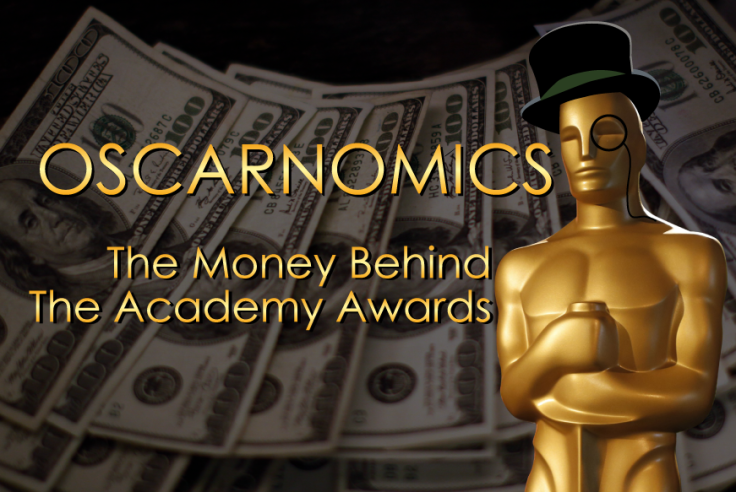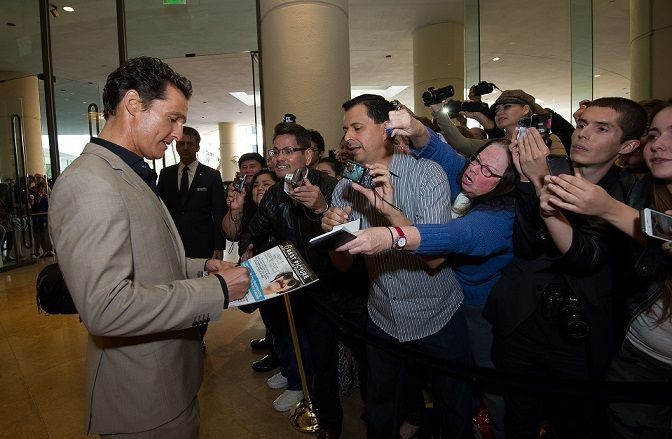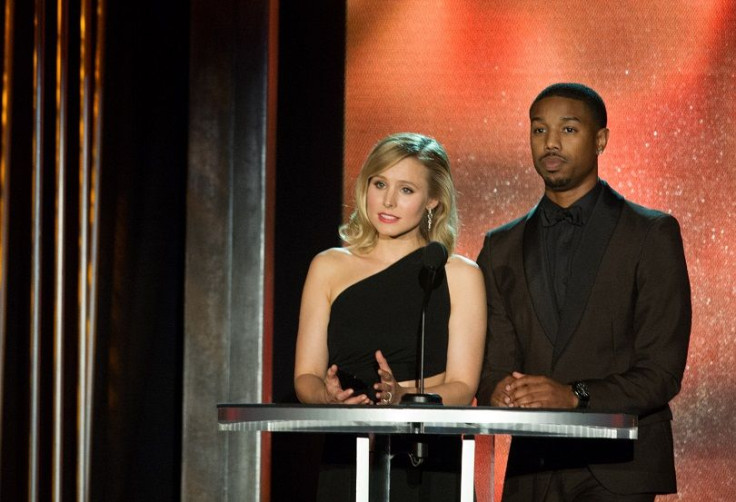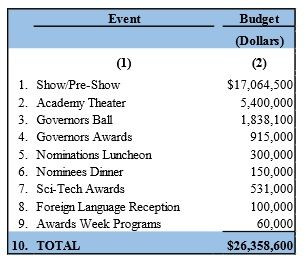Oscars 2014: The Real Winners? Los Angeles Hotels, Limo Drivers, Restaurants, Says Economic Benefit Study

This is the second in a five-part series on the economics of the Oscars.
If history is any guide, the 86th annual Academy Awards will be the most-watched entertainment program of the year. And yet the biggest winner in Hollywood this Sunday won’t be Cate Blanchett or David O. Russell or even ABC -- it’ll be the local economy of Los Angeles County.
For all the talk about global audiences and international box offices, the Academy Awards are a decidedly local affair. The event is true to its Los Angeles roots, and has remained so ever since 1929, when the first ceremony took place at a private dinner party at the Hollywood Roosevelt Hotel. Today the Oscars are held less than two blocks away from that original location, at the Dolby Theatre in the Hollywood and Highland shopping complex. The event provides a boost to the local economy that highlights a sizable subset of the area’s entertainment industry. Let’s call it the “awards industry.” The Oscars, the Emmys, the Grammys, the Golden Globes -- Los Angeles is known for its lavish back-patting events, and locals buy into it all with a sense of almost-civic pride.
“People here get really excited about these events in a way that people back East don’t,” said Roy Weinstein, managing director of the L.A.-based economic research firm Micronomics Inc. “With Oscar week coming up, people are planning parties. You can’t get a limousine. It’s hard to get a restaurant reservation at even some of the minor restaurants.”
Weinstein should know. He was recently commissioned by the Academy of Motion Picture Arts & Sciences to study the economic impact of the Academy Awards on Los Angeles County. Using last year’s event -- hosted by Seth MacFarlane and broadcast to roughly 40 million viewers -- Weinstein and his co-author, Kristina Stanford, calculated identifiable direct spending on transportation, wardrobes, hotels and restaurants. He also looked at spending by the Academy itself -- on venue rental, equipment, set construction and other related setup costs.
The final tally? The Oscars generate $67 million in immediate, identifiable economic benefits.

An economist for more than four decades, Weinstein is the go-to person for calculating the benefits of major events in Los Angeles. In the past, he’s studied the economic impact of the 2012 Primetime Emmy Awards, the 2013 Tournament of Roses and numerous others. In a phone interview, he said local organizations come to him because his research is objective and because, as an Angeleno himself, he is intimately familiar with the terrain.
He is also notoriously meticulous. “You have to be careful how you measure things,” he said. “What I’m interested in is calculating the incremental benefit of having that event here. By incremental, I mean benefits we obtain in Southern California, which we would not obtain absent that event.”
How The Oscars Measure Up
Weinstein’s numerous reports put the Oscars in context when compared to other L.A. events. For instance, while $67 million may sound like a lot, it pales in comparison to, say, the $415 million that he projects the 2015 Special Olympics summer games will generate. Even the 2011 NBA All-Star Game -- which produced $85 million by Weinstein’s estimate -- made a greater impact than the Oscars.
So the Oscars are a big deal, but in terms of direct economic impact, they’re not even the biggest event in Los Angeles County, let alone the country. Is the Academy disappointed that its economic footprint isn’t more seismic? Almost certainly, but as Weinstein said, “The numbers fall out where they fall out,” and that detachment is one of the reasons he was hired to crunch the numbers in the first place. “I can’t put words in their mouth, but each time I’ve done one of these, the entity I did it for probably hoped that the economic impact I found would be bigger,” he said. “But it is what it is.”
And what it is is still significant. Oscar-related spending affects a multitude of local industries. Last year, visiting attendees spent approximately $1.5 million on accommodations, transportation, food and drinks, entertainment and shopping. About $4 million was spent on limousines and wardrobe costs, and another $6 million on Oscar parties. The Academy itself shelled out $26 million, including $17 million for the Oscars show and preshow, $1.8 million for the Governors Ball (a custom menu by Wolfgang Puck isn’t cheap), $531,000 for the Scientific and Technical Achievement Awards, $300,000 for the Nominations Luncheon and $100,000 on the Foreign Language Reception.

And then there’s the boon to the local hotel industry, particularly establishments situated near the Dolby Theatre. Last year, 3,280 people attended the Academy Awards. About 15 percent of those -- or 492 people -- were from out of town. Hotel managers in the area say they are routinely booked up during awards season and, in particular, Oscar season. “Oscar weekend and the week leading up is our busiest time of the year,” said Jaclyn Slifer, a spokeswoman for Lowes Hollywood, a 628-room hotel on Highland Avenue. “I can tell you we do sell out.”
Though she would not discuss specific figures, Slifer said other awards ceremonies don’t offer quite the same benefit. Typically, Lowes sells out on the weekend of the Grammys and the Emmys, but not necessarily the entire week.
Ironically, large hotels like Lowes may benefit from the Oscars even more than smaller ones. “We are very busy year-round,” said Joe Blum, a rep for the 40-room Hollywood Oscars Suite, located right next door to the Dolby Theatre. “It’s easy to fill a small hotel. Of course, the Oscars are a part of Hollywood fame and one of the reasons we’re busy in the first place.”
If They See SoCal, They Will Come
Blum’s point about the allure of Hollywood fame speaks to what is perhaps an even more significant economic impact of the Oscars. As Weinstein’s research shows, various L.A. sporting events generate more revenue in terms of direct spending, but the Oscars have something those events don’t: namely, the power of movie magic. By Weinstein’s estimates, if just 0.25 percent of the 40.3 million people who watch the Oscars visit Los Angeles for four days as a result of seeing the telecast, the outcome would be an additional $149 million in local revenue. That more than triples the Oscars’ economic impact. Weinstein admits that such visitors are hypothetical (“I made sure to include an ‘if’ statement in that part,” he said), but he added the estimate is a conservative one given the global reach of the awards telecast and the “valuable publicity” that reach provides for the region.
And the timing doesn’t hurt either. Speaking to IBTimes from his 46th-floor office overlooking the Hollywood Sign and Pacific Ocean, Weinstein joked about enjoying a gorgeous Los Angeles day as the Northeast was being battered by one of its worst winters on record. He said it’s no accident that many local awards programs take place between January and March. “There is a tremendous impact of having the world see Southern California in the dead of winter,” Weinstein said. “People watch these events when they’re in the midst of snow, and freezing cold, and all the rest, and we’re here in our short sleeves -- and I kid you not, it’s in the 80s today.”

The Nonprofit That Profits
In 2011, the Academy of Motion Picture Arts & Sciences had revenue of $95.7 million, according to its most recent Form 990. The majority of that revenue -- $88.1 million -- came from the Academy Awards and related events. (The rest came from membership dues, publications and other miscellaneous sources.) At the same time, the Academy spent only $21.7 million on the Academy Awards. In the private-sector world, that would be a nice profit, except the Academy is a nonprofit organization. The purpose of the organization is not to please stockholders but to promote an industry.
And like many industry nonprofits -- the NFL is another example -- a large part of the Academy’s job is protecting its turf. That means vigilant enforcement of its many trademarks and copyrights: “Academy Award,” “Oscar,” and the statuette itself, to name a few. Just this month, the Academy slapped a Texas man with a lawsuit over replica Oscar trophies it says he was selling on eBay and Etsy. According to the lawsuit, the Academy identified at least 13 statuettes selling between $850 and $5,000. While it might sound like small potatoes for such a large organization, trademark experts say the Academy would be remiss if it did not aggressively address such situations. “They have a duty to protect their trademark,” said Joanne Ludovici, an intellectual-property attorney and partner at the Washington office of McDermott Will & Emery. “If you want to protect the value of that, you’re going to have to do it through enforcement.”
The Academy doesn’t publicize how much it spends on trademark enforcement, but it’s safe to say it doesn’t come cheap. According to its 990, the Academy spent $1.5 million on legal fees in 2011. Money well spent? Consider that the Oscar statuette is a globally recognized symbol of film excellence. Consider further that less than 3,000 of those statuettes have been doled out since 1929, and the only legitimate way to obtain one is to win it. The more knockoffs that enter the black market, the less special -- and therefore less valuable -- the Oscar becomes.
At the same time, too much saber-rattling, and trademark owners risk coming off as bullies. (See the aforementioned NFL.) Ludovici said the Academy, like many owners of famous marks, likely has a tiered strategy that involves going after the larger infringers first. “You have to balance that,” she said. “You want people to know you’re enforcing, but you don’t want to go so nuts that you alienate your consumer base.”

Then again, when you’re a target as big as the Academy, negative publicity goes with the territory. In 2012, Gavin Polone, the noted agent and film producer, argued that the Oscars have become culturally irrelevant, calling the awards “a meaningless and misleading worst offender” among the myriad award shows that take place annually. Writing for New York magazine’s Vulture blog, Polone cited the notoriously homogenous membership of the Academy’s roughly 6,000 members -- underscoring a dichotomy between the predominantly older and white men who decide the Oscar winners and the younger, more diverse audiences who actually go to the movies.
He also pointed out the countless millions that studios spend on “For Your Consideration” campaigns with the hope of currying favor with Academy voters, money that might be better spent on making more movies, or at least making better ones. “Whether people realize it or not, it would be a benefit to the entertainment industry, as well as the moviegoing masses, if we just learned to ignore the Oscars,” Polone wrote.
He may have a point (in fact, some of us have made similar arguments), but for the many industries in Los Angeles County on the receiving end of that $67 million, the argument is not about cultural relevance versus empty kudos. It’s about sustainability. And for an area that has struggled for decades to combat runaway production and keep filmmakers from fleeing to more tax-friendly locales, the booming “awards industry” is, at the very least, a nice tradeoff.
The Academy did not respond to a request to comment for this article, so it’s unclear why it chose now to study the Oscars’ economic impact on Los Angeles County. Back at his office on S. Figueroa Street, Roy Weinstein did not want to speculate, except to say that every entity he crunches numbers for has various reasons for wanting objective reports.
With the area’s broader entertainment industry in flux, could it be that the Academy envisions a day when even the Oscars might be wooed by a cheaper, hipper home? Weinstein said it’s hard to imagine, given the event’s association with Hollywood and deep cultural ties to the area’s movie-centric history. “With that said, we just had ‘The Tonight Show’ move back East,” he added. “From my standpoint, there isn’t anything in this world that’s guaranteed forever.”
The 86th annual Academy Awards telecast will take place on Sunday, 7 p.m. EST, on ABC. Ellen DeGeneres will host.
Got a news tip? Email me. Follow me on Twitter @christopherzara.
© Copyright IBTimes 2024. All rights reserved.






















